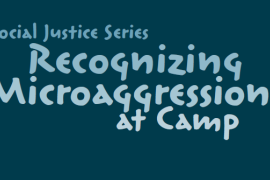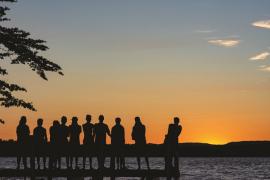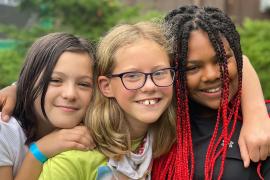Summer camp is a sacred community which, as a rule, has always been willing to find common ground in respecting and accommodating individual values and needs. The values and needs of campers with disabilities should not be an exception. The 24/7, joyous environment of summer camp builds identity, strengthens the community, and fosters leadership.
Nearly 9 percent of children in North America are defined as having significant disabilities, not including learning disabilities (National Center for Education Statistics, 2016). However, in 2012, campers with such disabilities represented only 3 percent of overall overnight campers (Mizrahi, 2012). We envision a future where campers with disabilities experience camp as fully and joyfully as their peers without disabilities. Children with disabilities should comprise at least 10 percent of the total camper population across North America, including serving children with complex disabilities and behavioral disabilities.
The Foundation for Jewish Camp (FJC) aimed to make it possible for camps at different stages of readiness to become involved in the inclusion enterprise. Their three-year initiative focused on staffing and training, paired with an advocacy awareness campaign. They began work with a cohort of six camps across the US falling under their auspices. Each camp hired an inclusion coordinator to be present at camp in the summer on a full-time basis and part-time during the year to work with staff, parents, and campers. They provided training for each camp’s leadership team with a focus on universal design, strategies to prevent and manage camper behaviors, preparing inclusive environments, and cooperative learning strategies.
An important aspect of this initiative was to assess the administrative and programmatic processes used to create and sustain a socially inclusive summer camp model. The organization contracted with an evaluation team (InFocus) to conduct a three-year longitudinal study to examine inclusive camp processes. With the support of this research, camps were able to make course corrections and develop best practices. The ultimate goal of the research was to identify best practices that can be used to create successful and scalable inclusion models across camps.
Quantitative and qualitative evaluation data were collected through telephone interviews with camp senior staff and inclusion coordinators, surveys completed by all camp staff, and a review of camper data from all six camps. By focusing on those camps that were performing at statistically higher levels in a given area (e.g., all staff feeling prepared for inclusion), best practices could be depicted so that they might be replicated across other camps. This evaluation also enabled us to identify components of camp where more attention may be needed (e.g., staff over-dependence on inclusion coordinator).
Findings
Serving Campers with Disabilities on the Rise
Camps reported a significant increase in the number of campers with disabilities served in 2016 in comparison to 2015 (122 percent increase across camps), more closely approximating natural proportions. Natural proportions imply that the number of individuals with disabilities in a setting is nearly equivalent to the proportion living in the overall community (i.e., 9 percent). Camps also reported success regarding the number of campers with disabilities who were served in 2015 who chose to return to camp. Numbers show 73 percent of campers with disabilities supported through the initiative returned to camp in 2016.
Within a “Decentralized” Model
Modifications and improvements in staffing patterns made a significant difference in the facilitation of inclusion in 2016. A major theme was the impact of the adopted “decentralized model” by many camps, where additional staff members helped promote inclusion throughout camp, rather than relying on the inclusion coordinator (IC) only. In a decentralized model, many staff members are prepared to take on the responsibility of welcoming and supporting all campers, rather than depending on those with expertise in disability services. While one-on-one staff were hired to support campers with more significant disabilities, extra staff members in the role of “floaters” were found to be helpful with all campers needing extra support, including those without labels.
Improvements in Staff Training
The 2015 evaluation revealed leadership and staff concerns about the quantity and quality of training. With this in mind, there was a concerted effort to plan for additional training material and strategies to best convey helpful information to staff. Unlike the reported 2015 focus on diagnostic labels, there was a shift in focus to addressing specific behavioral scenarios applicable to a wide range of campers. While the plan was to increase training for all staff, activity specialists as a group were specifically targeted by each camp, because these personnel felt the least prepared for inclusion. In 2016, most camps fulfilled their goal of expanding and improving staff training on inclusion.
Roles of the Inclusion Coordinator
ICs reported having more time to prepare for camp in 2016 and overall greater access to campers and their families prior to camp. As is the case in many camps that are supporting inclusion, in 2015 the IC was hired before the first camp session. Now, most ICs are working for camp year-round, at least five to 15 hours per week off-season, with the bulk of their work beginning in January. Overall, the early involvement of the IC led to increased communication with the leadership team and improved inclusion supports, as well as a more inclusive culture as the IC’s perspective was woven into all camp preparations. Knowledge of campers and staff enabled ICs to prepare camp environments and staff prior to the summer. With known campers returning to camp year-to-year, the IC was able to anticipate cabin dynamics with the addition of a new camper when she had access to camper applications prior to camp. Knowledge of support needs of all campers gave the IC an advantage in creating environments with a higher probability of a successful and socially inclusive camp experience.
Challenging Behaviors
Even before the beginning of the inclusion initiative, camp leadership reported addressing behaviors emitted by campers who had not been diagnosed or labeled with a disability at growing rates. Challenging behaviors exhibited by campers with and without disabilities will likely continue to be an issue that needs addressing for successful inclusive camp experiences. In a decentralized model, camp leadership prioritized the effective management of challenging behaviors during staff training. The idea was to educate and empower all staff members to be able to use preventative strategies to avoid challenging behaviors. If behaviors did occur, staff would be in a better position to address them rather than relying on the IC to “fix” the problem.
Continuum of Inclusion
There is a continuum of inclusion within the cohort that is reflected in the level and quality of participation, peer interactions, and sense of belonging for all campers. Senior staff and ICs are currently expressing the desire to progress along the continuum with the goal of achieving social inclusion. In 2016, camps in the cohort continued to be at different stages in their progression on the continuum — from campers merely having a physical presence to being socially included in the life of the camp. While it was difficult for many of those interviewed in 2015 to identify examples of social inclusion, staff readily identified specific occurrences of social inclusion at their respective camps in 2016. This occurred despite serving a significantly higher number of campers with disabilities. Progress on the continuum was seen when everyone was invested in the camp’s mission.
Sustainability and Scalability of Inclusion Efforts
Senior staff recognized that comprehensive training and support of an inclusive camp, initially launched by the foundation and external funding organizations, would be for naught unless inclusion efforts continue in summers ahead. Reports of “a changing culture” among campers and staff alike suggest a momentum in a permanent direction toward inclusive service delivery. This commitment includes a continuation of staffing and programmatic efforts even if no additional funds become available. One camp described this commitment by identifying themselves as a “mission-based versus financially based camp.”
Camp leaders are planning to solicit external grant funding to sustain these efforts. It has been identified that additional staffing (e.g., floaters, one-on-one supports) could be helpful in support of inclusion, and staff leadership will do whatever possible to fund this level of staffing. Nearly all camp leadership is treating the new IC position as a permanent staff position, and the salary for the IC has already been added as a permanent line item in the budget at several camps.
A Culture of Inclusion
Within a brief two years of the inclusive camp initiative, many impressive qualities are in place within the cohort. A “culture of inclusion,” the presence of highly skilled ICs, and an emerging decentralized model of supports all serve as a strong foundation moving forward. Camp staff are attracted to the inclusion concept, and many would choose to continue to work in this type of setting. It appears that inclusion is sustainable and that many, if not all, the practices being used to include campers with disabilities are achievable at other camps. The benefits accrued through the overall inclusive camp movement appear to far outweigh the necessary efforts and costs associated with making inclusive camp a reality.
Camp Values and Features for Successful Inclusion |
Inclusive camp values:
Features of a successful inclusive camp:
|
References
Mizrahi, J.L. (2012). Jewish camp for children with disabilities and special needs. Retrieved from jewishcamp.org/wp-content/uploads/2017/01/Jewish-Camp-for-Children-with-Disabilities-and-Special-Needs-Full-Survey-Findings-1.pdf
National Center for Education Statistics (2016). Children and youth with disabilities. Retrieved from https://nces.ed.gov/programs/coe/indicator/cgg/students-with-disabiliti…
Stuart Schleien, PhD, professor and department chair from the University of North Carolina Greensboro (UNCG), is an author and speaker with a long history of collaboration in the study and implementation of best practices in inclusive recreation. Stuart is also co-executive director of InFocus, an advocacy organization that empowers individuals of varying abilities who are marginalized by society to create more welcoming, accessible, and accommodating communities.
Kimberly Miller, from UNCG, has invested her career to the study and implementation of best practices in inclusive recreation. Kimberly has published and presented broadly on the topics of inclusive recreation, volunteering, and community inclusion.
Ginger Walton has a nursing background with extensive experience guiding families in planning for the lifelong needs of their children with disabilities. Ginger is co-executive director of the advocacy organization InFocus.
Carla Roth is currently a graduate student at UNCG studying therapeutic recreation and has been an integral part of the inclusive camp evaluation initiative.
Lisa Tobin is the director of Inclusion Initiatives at the Foundation for Jewish Camp, where she works with camps across North America to plan for successful inclusion of campers with disabilities. Lisa also oversees camper care initiatives.
Photo courtesy of JCC Camp Chi, Jewish Community Center Chicago, Chicago, Illinois.




